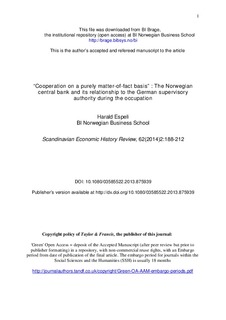Cooperation on a purely matter-of-fact basis” : The Norwegian central bank and its relationship to the German supervisory authority during the occupation
Journal article, Peer reviewed
Permanent lenke
http://hdl.handle.net/11250/296415Utgivelsesdato
2014Metadata
Vis full innførselSamlinger
- Scientific articles [2181]
Originalversjon
Scandinavian Economic History Review, 62(2014)2:188-212 10.1080/03585522.2013.875939Sammendrag
Recent publications have addressed the issue of the financial contribution of occupied countries to the German war economy from 1939 until 1945. Occupied countries contributed between 25 and 30% of the total German war costs. According to recent calculations, the Norwegian contribution has been between 6 and 7% of the occupied countries' total contribution; per capita the Norwegian war tribute was twice the average of the occupied West-European countries. The main aim of the paper is to explain how the relatively large Norwegian contribution came about by focusing on the institutional arrangements of financial transfers. The role of the central bank, Norges Bank, and its relationship with its German supervisory authority during the occupation is particularly important. The accommodating behaviour of Norges Bank (NB) and the shrewd institutional set-up and actual operandi of the monetary and financial occupation regime in Norway, based on indirect governance, served German interests better than the more frequent use of direct rule and open inference in the equivalent domestic institutions in Belgium, France and The Netherlands.
Beskrivelse
This is the author’s accepted and refereed manuscript to the article
